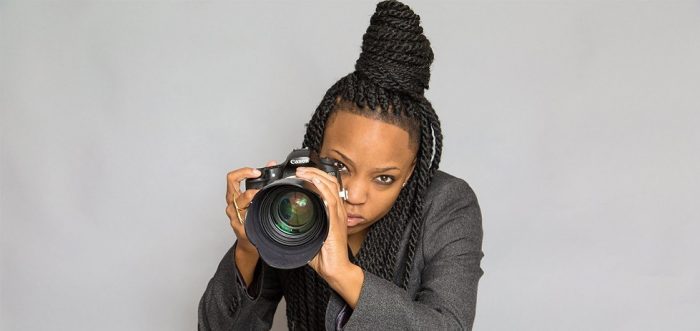Exploring the dark side of the queer community with Nneka Onuorah.
American director Nneka Onuorah will be travelling to Sydney to run a production masterclass for LGBTIQ filmmakers at the 2016 Mardi Gras Film Festival.
Here she talks to Ren Arcamone about her latest documentary THE SAME DIFFERENCE exploring the internalised homophobia, misogyny and complex gender roles prevalent amongst black queer women.
There’s been more discussion in recent years about sexuality, gender, and gender presentation, but The Same Difference still feels like its charting unexplored ground. When did you first realise you wanted to make this film?
I realised I wanted to make the film when I noticed that I didn’t want to be a part of my own community. There was a negative energy and a vibe, a lack of togetherness, and I had experienced it most of my life.
We see a lot of different opinions being voiced throughout this film. Was it hard to get people to open up about their experiences of discrimination? Was it hard to get people to talk about their prejudices?
It was definitely challenging to get people to open up. Often, when someone held an opinion that went against the norm, they would fear rejection. It put people in a really vulnerable place, whether they were admitting that they were a part of the discrimination, or that they had experienced it.
In comparison to the conservative “studs date femmes” mindset, you’re advocating for some pretty radical rethinking of gender and sexuality. Did you come up against any resistance when you were making this film?
I had a lot of feedback regarding the pregnant stud and stud-on-stud relationships. People were really uncomfortable with those lifestyles. The original pregnant stud I had as part of the project faced a lot of backlash, to the point where she decided not to do the film. Also, the participants in the documentary would think they were comfortable and confident with themselves until they had to get on camera, and then they didn’t want to risk the heat from the community. It was pretty sad.
Much of the film is focussed on the gender presentation of masculine lesbians, the AGs and studs. Do you feel like there’s a greater policing of masculinity than femininity?
I do believe there is a greater policing of masculinity. Masculinity is seen as power in the gay community. Well – not only in the gay community – in every community. The characteristics associated with masculinity, people wear like a badge of honour. When I was younger, I’d present as more masculine but still wear my hair straight, and my peers would go, “You ain’t no stud, you’re a femme”. When someone says, “You’re a femme,” most people take it offensively, as if it’s code for “you are weak”. Like when a boy gets called a sissy or faggot; people laugh. They laugh because the man is showing feminine characteristics. But why is it so bad to be a “femme” or to “throw like a girl”? If you want to fit in on the masculine side of the spectrum, there are more rules.
Several speakers in the film are given the chance to confront people who have badmouthed them online or around town, and some of the haters seem to rethink their stances. Do you think you changed some minds while you were making this film?
It absolutely changed minds. In the Q&A, women would often apologize for things they said. A lot of the time, you just need to hear yourself. You don’t realize how ignorant you sound.
I think, also, when audience members see specific people in the film being bullied, they want to defend them. But then they look at themselves and go, “Wait a minute – I do that too.” It’s definitely a “check yourself before you wreck yourself” type of film.
In your experience, is there much support out there for queer films, both in terms of production/distribution, and in terms of audience interest?
This is my favourite question of all. There isn’t a lot of support for queer films – at least not for films that tell our authentic stories. Mainstream media goes after the same types of stories, stories that don’t reflect all aspects of who we are. Mainly we see marriage equality and transgender narratives. But there is so much more going on. In a lot of ways, we are broken and segregated as a community. Separated into gays and lesbians, then into black or white, then into labels. But mainstream media wants to highlight the rainbows and parades. I went in making a movie and this has turned into a real battle. I’ve seen how the world at large really feels about us. It’s hard but I am prepared to fight, and I won’t stop until we get a platform. If this film doesn’t get one I will make one. I have a dream.
